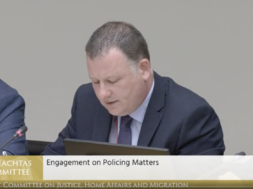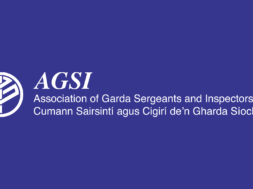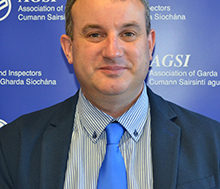Select Committee on Justice, Defence and Equality
Justice Votes Group – Supplementary Estimates 2013
Opening Remarks by the Minister for Justice, Equality and Defence,
Alan Shatter T.D.
20th November, 2013
Chairman,
I want to thank the Committee for making time available today to consider my request for a Supplementary Estimate for the Garda Síochána and Justice and Equality Votes.
There are five individual votes within the Justice Group which, to ensure the effective management of resources for the entire Justice Sector, are treated as a single Group. Therefore, while there is a requirement for additional funding for the Garda Vote of €50.994 million and a provision of almost €5 million needs to be made within the Justice and Equality Vote, to fund initial payments to the women who were admitted to and worked in the Magdalen Laundries, a significant proportion of the additional requirement can be funded by savings in other areas within the Vote Group.
Thus, of the additional €51 million required for the Garda Vote and €5 million for the Magdalen related payments in the Justice Vote, almost €24 million is available from elsewhere within the Vote Group, leaving the total external funding required by the Justice Group at just over €32 million.
The offsetting savings to reduce the external funding requirements are primarily in the Justice and Equality Vote (at least €17 million), Prisons (€5 million), and a combined surrender balance of over €1.5 million in the Courts Service and Property Registration Authority Votes.
This leaves the net supplementary estimate requirement for the Justice Vote Group at €32 million (some 1.4% of the total Justice Vote Group gross allocation) not €51 million – a fact conveniently overlooked when the Fianna Fail spokesperson took to the airwaves earlier this week.
The Deputy also failed to mention that a supplementary estimate requirement is neither unusual nor unexpected in a financial allocation that is as broad and diverse as the Justice Vote Group. Nor is it unusual that savings in one Vote within the Group are reallocated to offset costs in another.
For example:
In 2007, when the Deputy’s own party was in Government, the Supplementary Estimate requirement for the Justice Vote Group was €67 million, of which €25 million was needed for the Garda Vote. This was partly offset by a €12 million underspend elsewhere in the Vote Group leaving a requirement for external funding of €55 million.
In 2009, €30 million was needed to supplement the Garda Vote and this was partly offset by a €15 million underspend in other Votes..
In 2010, €40 million was moved within the Garda Vote to meet an additional requirement in payroll costs.
Is the Deputy suggesting that, in 2013, our Gardai shouldn’t get paid?
It has been interesting to note some of the media coverage in relation to this years Justice Vote Group requirement for a Supplementary Estimate in relation to the Garda Vote. On the one hand, there has been a suggestion that An Garda Siochana is under resourced and the Gardai rendered incapable of properly doing their job. On the other hand, there has been, rightly, extensive coverage of hugely successful Garda operations and seizures which have resulted in, for example:
· 89 people arrested in a 24-hour period earlier this month, under Operation Wireless, following more than 400 planned searches across the country in relation to robbery, burglary, theft, handling stolen property, possession of drugs and firearms offences
· A coordinated drive against those involved in burglaries under Operation Fiacla. The latest CSO figures show that burglary offences decreased by 8.9%, continuing the trend observed since the introduction of this Operation. Operation Fiacla is intelligence driven and specific burglary initiatives have been implemented in each Garda Region to target suspect offenders. As of 31 October, 6,972 persons have been arrested and 3,971 persons have been charged with burglary offences under Operation Fiacla.
· Operation Nitrogen which continues to be very successful in identifying and dismantling cannabis cultivation sites across all areas of the country. Seizures of cannabis plants valued at in excess of €16 million were recorded for the first three quarters of 2013. A very significant seizure of plants worth an estimated €2 million was made on 21st October at cannabis cultivation sites in counties Kerry, Roscommon and Cavan.
· Operation Stilts which is an ongoing overt Garda operation targeting anti-social behaviour and drug-related crime in Dublin city centre locations.
· Just this week, on 18th November, a major production facility was detected in Waterford which had the capacity to launder approximately 10 million litres of fuel per annum with a potential loss to the Exchequer of approximately €5m per annum. A number of large tanks and ancillary equipment were seized and the laundering plant was dismantled. Investigations into the fuel laundry operation are continuing.
The members of this Committee and the general public can rest assured that An Garda Síochána continue to rise to the many challenges facing the organisation on a daily basis. Operational decisions taken by the Garda Commissioner and those working with him have resulted in the targeting of criminal gangs and those involved in subversive activities, with the result that many have been convicted and sentenced before our Courts and are currently in jail.
The most recently published CSO Crime Statistics detailed a reduction in criminal offences in 12 of the 14 crime groups, with an overall 8% reduction in the incidence of crime in the 12 months to mid 2013.
These statistics underline the positive impact the Gardaí are having on crime and the success of the Commissioner’s strategy to maximise the use of resources with intelligent and targeted deployment.
In his enthusiasm to make some political point on the national airwaves, the Fianna Fail spokesperson also appears to have conveniently forgotten that the Fianna Fail led Government’s “National Recovery Plan 2011-2014”, published on 24th November 2010, contained expenditure ceilings for the Justice Sector which would have made it impossible for An Garda Síochána and other areas of the Justice Sector to operate effectively. In fact, it is a racing certainty that had the Fianna Fail figures been applied we would have, in all probability, been facing a situation where Garda numbers might have dropped to 11,500 rather than the 13,000 figure that the current Government have set as our objective target strength for the Force. It is, once again, grossly hypocritical of Fianna Fail to be criticising the Government over Garda numbers, calling for increases and shouting the odds over seeking a supplementary estimate to make available the funding necessary to maintain Garda services when their own plan would have almost certainly have ensured that Garda numbers would have had to drop to unacceptably low levels or alternatively a massive supplementary would have been required to bridge the gap.
Fortunately, I have managed to ensure that the current expenditure ceilings are much healthier for the Group – by over €400 million for the three years 2012 to 2014 (inclusive) when compared with the previous Government’s provision. In 2013, for example, the current expenditure ceiling proposed under the previous Government’s National Recovery Plan was €2.009 billion. The actual current expenditure allocation per the Revised Estimate Volume was €2.163 billion, an increase of €154 million.
In real terms, the likelihood is that had the previous Government’s expenditure ceiling remained in place, this Committee would have been discussing a supplementary estimate requirement of €154 million plus €32 million, which amounts to €186 million across the Vote Group, rather than the amount of just over €32 million required in the current year.
Leaving aside the figures for a moment and returning to the contention from some quarters that a budgetary shortfall in some way inhibited members of An Garda Síochána in their work, I would like to say the following:- Firstly, my position on this matter has been crystal clear from the beginning of the year. I have said that the funding required for Garda payroll and other essential requirements would be available and this is case. The process we are undertaking today is evidence of this. It is worth pointing out again that a supplementary estimate in the case of the Garda Vote is not an unusual occurrence nor unique to my period as Minister for Justice.
By far the largest Vote within the Group is the Garda Síochána Vote, which accounts for some 63% of current expenditure. Almost 90% of that expenditure – in the Garda Síochána Vote – is accounted for by payroll and pension costs.
It is, therefore, almost inevitable, in the context of a supplementary estimate for the Garda Vote, that a proportion of this will involve either pay or pensions. The fact that there are potentially over 1,200 Garda members with the required service who could exercise an option to retire on age grounds means that Garda payroll costs are something of an imprecise science.
This notwithstanding, the reality is that the Commissioner has over 13,137 (at the end of October) members of An Garda Síochána, plus 1,129 Garda Reserve members, available to him to provide a policing service. An additional 187 men and women are presently in training for the Garda Reserve. There are also over 2,000 civilian staff providing essential support services in An Garda Síochána. In addition, civilian personnel have been redeployed from elsewhere within the Public Sector to meet urgent needs within An Garda Síochána in areas such as Garda Vetting Unit, with the aim of reducing processing times in this very vital area.
There are other factors contributing to the total payroll costs, including the overtime and allowance costs associated with the G8 Summit in June. However, I would point out that a separate once-off allocation of €10 million was provided in the current year to meet additional costs associated with the security arrangements for Ireland’s Presidency of the European Union and the OSCE conference held in Dublin December 2012. As with all major Garda operations, security requirements were kept under constant review by Garda Management, with the result that a significant saving of approximately €6.4 million emerged from this allocation, which was used to offset the G8 and other costs including payroll.
It is, again, important to note that a significant element of any supplementary estimate is the technical rebalancing of allocations between subheads approaching year end. The under spend I have alluded to in the in the EU Presidency/OSCE subhead is an example of this. It is also important to point out that the additional payroll costs have yielded significantly more than the budgeted pension contributions and this has provided almost €7 million in additional appropriation-in-aid receipts to balance the additional payroll costs.
Like all areas of the Public Sector, An Garda Síochána has taken its share of reductions over recent years. An obvious manifestation of this has been the moratorium on recruitment with the last recruits entering Templemore in 2009. I am particularly pleased that this situation is to change during 2014, with a new recruitment campaign due to commence within the next few weeks. I am also pleased that I was recently able to announce, in the context of the recent Estimates for 2014, that the targeted objective strength An Garda Síochána will be maintained at 13,000 members.
The total available spend on the Garda fleet in the period 2012-2014 is €18 million. Out of this allocation, 651 vehicles have been purchased in the 2012-2013 period with an amount of €4 million available for the fleet in 2014. The corresponding figure for the previous three-year period 2009-2011 under the previous administration was less than €5 million with 217 vehicles purchased. .
There is a technical adjustment required within the Garda Vote to offset receipts from certain fixed charge notices arising from the operation of the “Go Safe” Road Safety Camera contract against the outsourced cost of providing this service. The key objective of this road safety initiative is to reduce road deaths and bring about improvements in driver behaviour. I am pleased to say that all the evidence points to the success of this measure.
Turning now to the Justice and Equality Vote, there is a technical supplementary estimate required for this Vote, with additional budgetary requirements offset by savings and reprioritisation of expenditure from elsewhere within the Vote.
Almost all of the areas which require additional provision within the Justice and Equality Vote in 2013 are within Programme C – “Facilitate the Provision and Administration of Justice”. This particular programme covers areas such as Criminal and Civil Legal Aid, the Forensic Science Laboratory and the Commissions and Special Inquiries subhead.
It is proposed, by way of technical supplementary estimate, to increase the grant-in-aid provision available to the Legal Aid Board by €1.1 million in 2013. This requirement is attributable directly to additional responsibilities taken on by the Legal Aid Board in relation to Legal Aid Custody issues and other ad-hoc Legal Aid Schemes. In addition, through its Refugee Legal Service, the Legal Aid Board is providing appropriate legal representation to applicants making their cases for Subsidiary Protection. The additional requirement in this case arises from new Regulations which provide for applicants to be interviewed as part of the first instance investigation of their Subsidiary Protection application. Moreover, in the event of a negative recommendation following the first instance investigation of their case, they will have the opportunity to appeal.
While the cost of criminal legal aid has reduced in recent years due to the introduction of a number of cost-reducing measures, including reductions in legal fees, an additional provision of up to €3 million will be required in 2013. The total expenditure is expected to be in the region of €50.5 million, which is on a par with 2012 and significantly less than the two previous years, when expenditure exceeded €56 million per annum.
A significant increase of €7.3 million is also required in respect of the payment of awards made by the Criminal Injuries Compensation Tribunal. This particular subhead is cash limited and the only mechanism available for increasing the funding in the subhead is through the supplementary estimate process.
The value of accepted awards by applicants now stands at approximately €7.3 million in excess of the available funds in the subhead. This excess is largely due to a number of significant awards of compensation that have been made in recent years and have placed great financial strain on the Scheme. Various administrative arrangements are in place to ensure that the Scheme stays within the available budget, including a financial limit of €250,000 on the amount that can be paid in any individual case in a particular year. This means that, in the case of the larger awards, it may take the State several years to pay the award.
It is considered prudent at this stage to discharge the outstanding accepted awards in full, which gives rise to the requirement for a technical supplementary estimate.
I should also point out that I am currently considering detailed proposals in relation to the overhaul of this Scheme, which are likely to include placing it on a statutory basis, more streamlined administrative arrangements, and other revisions necessary to being the Scheme into line with modern governance practices and financial procedures. The details of any revised Scheme will be published in due course but there are various issues which require further clarification and discussion with relevant parties before a reformed Scheme is put in place.
I am very pleased that the work of my Department and the Inter Departmental Group established to examine the implementation of the recommendations in the Justice Quirke Report will shortly mean that lump-sum ex gratia payments will be made in respect of a number of the applications from women who were admitted to and worked in Magdalen Laundries. While I have at all times being keen to simplify, as much as possible, the application process, there were still a number of important steps and processes to be gone through. In addition, it has also been necessary to establish the additional benefits whether through the social welfare system or the health system to which these women may be entitled. This will enable the women make an informed decision regarding any offer from the State.
We are at the stage where offers will be made in some cases very shortly and therefore it is considered prudent to provide for payments to the women in a proportion of these cases prior to the end of this year. It is likely, however, that the bulk of the payments will be made in 2014 and sufficient budgetary provision will be made by the Government in 2014 also.
There are a number of relatively small savings within the subheads in Programme C. This programme also includes the Commissions and Special Inquiries subhead, which has a saving of €2.5 million. The cost of the recent Court of Appeal Referendum is also being met from this subhead. The bulk of the funding for these costs comes from surplus appropriation-in-aid receipts arising mainly from the measures I have taken since my appointment as Minister for Justice and Equality to clear the backlog in Citizenship applications.
The savings to assist in offsetting the additional requirement in the Garda Vote will be reflected in surrender balances in the other votes in the group. Leaving aside the additional €4.9 million for the Magdalen related payments and costs, which was always going to be funded from outside the Vote Group, the Justice Vote will have a surrender balance of at least €17 million to offset the cost of the Garda supplementary. The savings in question arise across a range of areas, including various administrative subheads, and other subheads such as INIS and Asylum Seeker Accommodation.
The Prisons Service will have a saving of €5 million in capital expenditure, due mainly to some payments in relation to the work on Cork and Limerick Prisons arising in 2014 rather than 2013, as originally envisaged. This is being used to directly offset the additional investment in the Garda Transport Fleet.
There are relatively small savings in the Courts Service and Property Registration Authority Votes which will form a cumulative surrender balance of approximately €1.5 million in respect of these Votes.
This is effectively the background to the supplementary estimates before this Committee today. I am sure that the Committee appreciates the varied range of issues impacting on the Justice Sector, which makes it absolutely essential to have the flexibility to utilise savings in one area, irrespective of the Vote to which it belongs, to offset costs in others.
On that note; I recommend the supplementary estimate for the Garda Síochána and Justice and Equality Votes to the Committee and I am happy to discuss any issues that arise.
ENDS









